Class 12 DifferentiationRD SHARMA EX 115 Example 8, If x^y = E^(xy), prove that dy\dx= log x/(1log x)^2 CBSE 00C, 10C, 11,13Now by differentiating the above equation with respect to x , then we get =› d {log (y)}/dx = d { (x2)logx}/dx By applying multiplication rule of differentiation =› (1/y) {dy/dx} = logx (x2)/x =› dy/dx = y logx (x2)/x =› dy/dx = e^xlogx/x² logx (x2)/xNow differentiate the equation which was resulted At last, multiply the available equation by the function itself to get the required derivative Now, as we are thorough with logarithmic differentiation rules let us take some logarithmic differentiation examples to know a little bit more about this Problems Q1 Find the value of dy/dx if, \(y = e^{x^{4}}\) Solution Given the function \(y

Find Dy Dx When Log Xy E X Y 2 Youtube
Differentiate e^x-y=log(x/y)
Differentiate e^x-y=log(x/y)-First, let us consider the derivative (with respect to x) of xˣ (which I will write as x^x) Let y = x^x Then y = e^ln (x)^x = e^ ln (x)*x, where e is the base of natural logarithms Let u = ln (x)*x Then y = e^u So dy/du = e^u = y = x^x Also, by the product rule, du/dx = ln (x) * (dx/dx) x * {d ln (xLe produit de x y est donc environ 7,1 × 10 2 Les échelles logarithmiques Elles sont utilisées pour représenter des phénomènes pouvant varier par exemple de à Elles permettent d'amplifier les variations des valeurs proches de 0 et de rendre moins importantes les variations pour les grands nombres, en mettant en évidence plutôt les variations relatives




Ex 5 5 3 Differentiate The Function Log X Cos X Teachoo
Get an answer for '`y = log_2 (e^x cos(pix))` Differentiate the function' and find homework help for other Math questions at eNotesY = x x 1) Take natural logarithms of both sides of the equation y = f ( x) and use the Laws of Logarithm to simplify ln y = x ⋅ ln x 2) Differentiate implicitly to respect to x 1 y ⋅ d y d x = x ⋅ 1 x0 votes 1 answer If y = Acos (logx) Bsin(log x), then prove that x^2(d^2y/dx^2) x(dy/dx) y = 0 asked in Limit, continuity and differentiability by Raghab (505k points) differentiation;
SolutionShow Solution Differentiate it with respect to x we get, \ = e^x \frac {d} {dx}\left ( \log \sin2x \right) \left ( \log \sin2x \right)\frac {d} {dx}\left ( e^x \right) \left \text { Using product rule and chain rule} \right\ \ = e^x \frac {1} {\sin2x}\frac {d} {dx}\left ( \sin2x \right) \log \sin2x\left ( e^xClick here👆to get an answer to your question ️ Let y = x^x^x , then differentiate y wrt x asked in Class XII Maths by nikita74 (1,017 points) Differentiate log log (logx 5 ) wrtx continuity and differentiability
Differentiate y = e^cos x About Press Copyright Contact us Creators Advertise Developers Terms Privacy Policy & Safety How works Test new features © 21 Google LLC Best answer Let y = (log x)x xlog x Let u = (log x)x and v = xlog x then we have y = u v Therefore, dy/dx = du/dx dv/dx (1) Now, u = (logx)x Taking logarithm on both sides, we have log u = xlog (logx) Differentiating both sides wrt x, we haveDifferentiate the functiony = log2(e−x cos πx) Get solutions We have solutions for your book!




Ex 5 4 10 Differentiate W R T X In Cos Log X E X Teachoo



If X Y Y X What Is Dy Dx Quora
Transcript Ex 54, 10 Differentiate wrt 𝑥 in, cos (log𝑥 𝑒^𝑥), 𝑥 > 0Let 𝑦 = cos (log𝑥 𝑒^𝑥 ) Differentiating both sides 𝑤𝑟𝑡𝑥 𝑦^′ = (cos (log𝑥 𝑒^𝑥 ) )^′ 𝑦^′= 〖−sin 〗 (log𝑥𝑒^𝑥 ) (log𝑥 𝑒^𝑥 )^′ 𝑦^′= 〖−sin 〗 (log𝑥𝑒^𝑥 ) ( (log𝑥 )^′ (𝑒^𝑥 )^′ ) 𝑦^′ = 〖− sin 〗 (log𝑥𝑒^𝑥 ) (1/𝑥 𝑒^𝑥 )Convert to Logarithmic Form y=e^x y = ex y = e x Reduce by cancelling the common factors y = ex y = e x Convert the exponential equation to a logarithmic equation using the logarithm base (e) ( e) of the left side (y) ( y) equals the exponent (x) ( x) loge(y) = x log e ( y) = x If x^y = e^(xy), then show that dy/dx = logx/{log(xe)}^2 asked Mar 11 in Continuity and Differentiability by Tajinderbir (371k points) continuity;



5 Derivative Of The Logarithmic Function
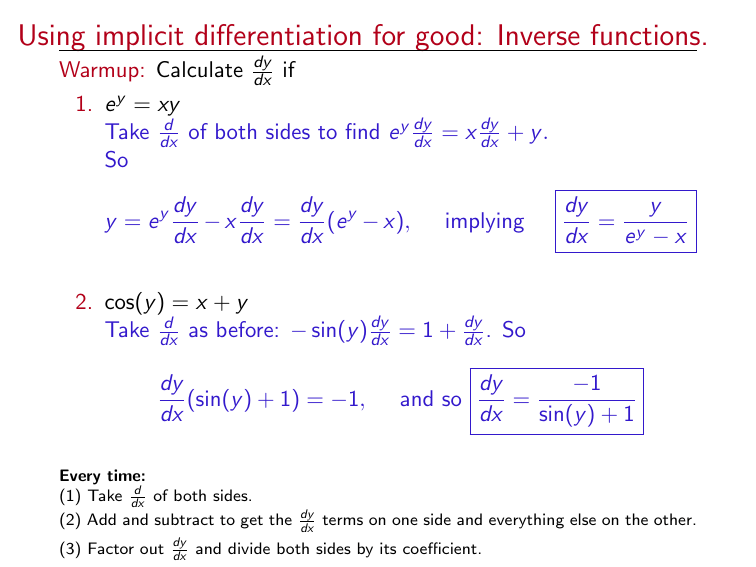



Using Implicit Differentiation For Good Inverse Functions
Given Y= e power x log(sin 2x) find dy/dx Now we need to differentiate on both sides we get Dy/dx = d/dx ( e^x log sin 2 x) = e^x d/dx (log sin 2 x) log sin 2 x d/dx (e^x) = e^x 1/sin 2 x d / dx(sin 2 x) e^x log sin 2 x = e^x 1/sin 2 x (2 cos 2 x) e^x log sin 2 x = e^x(2 tan 2 x log sin 2 x) So dy/dx = e^x (2 tan 2 x log (sin 2 x) New questions in Math ♥️♥️Ajao GírlsSolve your math problems using our free math solver with stepbystep solutions Our math solver supports basic math, prealgebra, algebra, trigonometry, calculus and moreFind the Derivative d/dx y=( log of x)/(1 log of x) Differentiate using the Quotient Rule which states that is where and The derivative of with respect to is Differentiate Tap for more steps By the Sum Rule, the derivative of with respect to is Since is constant with respect to , the derivative of with respect to is Add and The derivative of with respect to is Combine and




Engineering Mathematics Notes



Find Dy Dx When X And Y Are Connected By The Relation If X Ex Y Prove That Dy Dx X Y X Log X Studyrankersonline
Find an answer to your question e^xy=logx/y Differentiate this sakshilad06 sakshilad06 Math Secondary School answered E^xy=logx/y Differentiate this 1 See answer sakshilad06 is waiting for your help Add your answer and earn pointsDifferentiate y = x lo g x lo g x x Medium View solution View more Learn with content Watch learning videos, swipe through stories, and browse through concepts Concepts > Videos > Stories > POPULAR CHAPTERS BY CLASS class 5 The Fish Tale Across the Wall Tenths and Hundredths Parts and Whole Can you see the Pattern?Find dy/dx xe^y=xy Differentiate both sides of the equation Differentiate the left side of the equation Tap for more steps Differentiate using the Product Rule which states that is where and Differentiate using the chain rule, which states that is where and Tap for more steps To apply the Chain Rule, set as Differentiate using the Exponential Rule which states that is where




Ipe Material Notes




Derivative For E X Y X Y Youtube
Stack Exchange network consists of 177 Q&A communities including Stack Overflow, the largest, most trusted online community for developers to learn, share their knowledge, and build their careers Visit Stack ExchangeA = (logx)x ⇒ loga = xlogx⇒ a1Calculus Find the Derivative d/dx y = log of 2x y = log(2x) y = log ( 2 x) Differentiate using the chain rule, which states that d dx f (g(x)) d d x f ( g ( x)) is f '(g(x))g'(x) f ′ ( g ( x)) g ′ ( x) where f (x) = log(x) f ( x) = log ( x) and g(x) = 2x g ( x) = 2 x Tap for more steps To apply the Chain Rule, set u u as 2 x 2 x




Verify Jj 1 Given X E U Cos V Y E U Sin V Mathematics Stack Exchange




Partial Derivatives Of Z E Xy Youtube
> Differentiate (log x)^x wit maths Differentiate (lo g x) x with respect to lo g x Easy Answer y = (lo g x) x Taking log on both sides, we get, lo g y = x lo g (lo g x) Differentiating wrt x, we get, y 1 d x d y = lo g x x × x 1 lo g (lo g x) d x d y = (lo g x) x (lo g x 1 lo g (lo g x)) Answer verified by Toppr Upvote (0) Was this answer helpful?Chapter Problem FS show all show all steps Differentiate the function y = log 2 (e −x cos πx) Stepbystep solution 100 %(4 ratings) for this solution Chapter Problem FS show all show all steps Step 1 of 4 Consider the following function To differentiate the function, use change ofAnswer y = (logx)x xlogx Let y = ab dxdy =?




Ex 5 5 15 Find Dy Dx Of Xy E X Y Class 12 Ex 5 5



What Is Dy Dx If E Xy 4xy 0 Quora
Ex 55, 3 Differentiate the functions in, (log𝑥 )^cos𝑥 Let 𝑦=(log𝑥 )^cos𝑥 Taking log both sides log𝑦 = log〖〖 (log𝑥 )〗^cos𝑥 〗 log𝑦 = cos〖𝑥 〖log 〗(log𝑥 ) 〗 Differentiating both sides 𝑤𝑟𝑡𝑥 𝑑(log𝑦)/𝑑𝑥 = 𝑑(cos〖𝑥 〖 log 〗(log𝑥 ) 〗 )/𝑑𝑥 𝑑(log𝑦Calculateur de dérivées Dérivée de log (1x) en x ordre 2 = 1/ (x^22*x1) Montrer la solution étape par étape Attention, log logarithme naturel Dessiner le graphique Modifier l'expression Lien direct vers cette page Valeur au x=Differentiate the following wrtx y = log ex3 log x3 Maharashtra State Board HSC Science (Electronics) 11th Textbook Solutions 6926 Important Solutions 17 Question Bank Solutions 4570 Concept Notes & Videos 252 Syllabus Advertisement Remove all ads




Find Dy Dx When Log Xy E X Y 2 Youtube




Logarithm Wikipedia
Differentiate the following wrtx y = extanxcosxlogxx 5x Maharashtra State Board HSC Science (General) 11th Textbook Solutions 8028 Important Solutions If x^y = e^x–y, then shown that dy/dx=log/(1logx)^2 asked in Mathematics by Devanshi (674k points) class12;Well, we know that math\qquad \log_x(a) = \dfrac{\ln(a)}{\ln(x)}/math




If X Y E X Y Prove That Dy Dx Logx 1 Logx 2




Derivative Of E X Y X Y Prove That Derivative Is Logx Log E X 2 Brainly In
Answer to Differentiate the following with respect to x y = {log x} / {e^x} By signing up, you'll get thousands of stepbystep solutions to Ex 54, 9 Differentiate wrt x in, cos𝑥/log𝑥 , x > 2Let 𝑦 = cos𝑥/log𝑥 Let 𝑢 = cos𝑥 & 𝑣 = log𝑥 ∴ 𝑦 = (𝑢)/𝑣 Differentiating both sides 𝑤𝑟𝑡𝑥 𝑦^′ = (𝑢/𝑣)^′ 𝑑𝑦/𝑑𝑥 = (𝑢^′ 𝑣 − 〖𝑣 〗^′ 𝑢)/𝑣^2 𝑑𝑦/𝑑𝑥 = ((cos𝑥 )^′ log𝑥 − (log𝑥 )^′ 〖 cosGet Instant Solutions, 24x7




If X Y E X Y What Is Dy Dx Quora
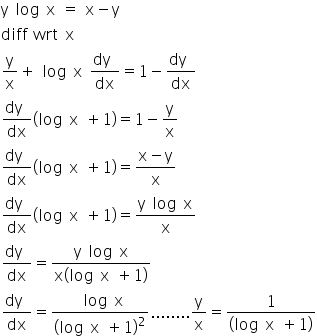



If Y Log X X Y Prove That Dy Dx Log X 1 Log X 2 Mathematics Topperlearning Com 2dolmeyy
About Press Copyright Contact us Creators Advertise Developers Terms Privacy Policy & Safety How works Test new features Press Copyright Contact us CreatorsI'm assuming you're trying to differentiate math\log_x(a)/math with respect to x?Multiply − 1 1 by 1 1 Differentiate using the chain rule, which states that d dx f (g(x)) d d x f ( g ( x)) is f '(g(x))g'(x) f ′ ( g ( x)) g ′ ( x) where f (x) = ex f ( x) = e x and g(x) = −x g ( x) = x Tap for more steps To apply the Chain Rule, set u 3 u 3 as − x x




What Is The Derivative Of Log Y With Respect To X Mathematics Stack Exchange




If Ylogx X Y Prove That Dy Dx Logx 1 Logx 2
Ex 57, 9 Find the second order derivatives of the function 〖 log〗〖 (log〖𝑥)〗 〗 Let y =〖 log〗〖 (log〖𝑥)〗 〗 Differentiating> If y = log7 (log x) find d maths If y = Differentiate wrt x lo g (lo g x) Easy View solution View more Learn with content Watch learning videos, swipe through stories, and browse through concepts Concepts > Videos > Stories > POPULAR CHAPTERS BY CLASS class 5 The Fish Tale Across the Wall Tenths and Hundredths Parts and Whole Can you see the Pattern? Differentiate wrt x `y=x^(log x e^x)` Step by step solution by experts to help you in doubt clearance & scoring excellent marks in exams




If X Y E X Y Show That Dy Dx Logx Log X E 2




If Log X Y Log 2 1 2logx 1 2 Logy Then Youtube
We have to differentiate y=log x2 Solution We know that log xn= n log x log x 2 = 2 log x(i) We have learnt that dy/ dx (log x) = 1/x Hence equation i becomes dy / dx = 2 log x = 2 1/x = 2/xHow to differentiate y = x^x Tab S7 and Tab S7 Hero OLV Watch later Share Copy link Info Shopping Tap to unmute If playback doesn't begin shortly, try restarting your deviceX) Now see if you can continue As per your comment above, if log is meant to be of a different base, say log b, the same tactic works You would have e ( log b x) instead x Take a logarithm of both sides to get log x Differentiate both sides to get y ′ y = 2 log




Solve Dy Dx E X Y E 2logx Y




If E X Y X Y Then Prove That Dydx Logx Logex 2
Class 6 Maps Practical GeometryWelcome to Sarthaks eConnect A unique platform where students can interact with teachers/experts/students to get solutions to their queries Students (upto class 102) preparing for All Government Exams, CBSE Board Exam,




Ex 5 5 3 Differentiate The Function Log X Cos X Teachoo




Ex 9 5 10 Show Homogeneous 1 Ex Y Dx E X Y 1 X Y




Find Dy Dx In Each Of The Following E X Y Log X Y Youtube




If X Y E X Y Then Let S Prove Dy Dx Logx Log Ex 2 Brainly In




If X Y E X Y Then Dy Dx Is A 1 X 1 Logx B 1




Find Dy Dx In Each Of The Following E X Y Log X Y




Find Dy Dx When Log Xy E X Y 2




Ipe Material Notes




If Xy Ex Y Show That Dy Dx Logx Log Xe 2 Maths Continuity And Differentiability Meritnation Com



1




How Do You Differentiate E Xy Use Implicit Differentiation Youtube




Implicit Differentiation Advanced Example Video Khan Academy



Jntua Ac In Gate Online Classes Registration Downloads Material A Pdf




If E X Y Log X Y Then Dy Dx Youtube




Find Y For Ln X Y Arctan Xy Mathematics Stack Exchange




Find The Derivative Of The Function F X 5 Sin X E X Log X If X E Sinh Y Find Frac D Y D X I




If Xy Log Xy Then Dy Dx



Http Maths Dur Ac Uk Users Daniel Evans Mes Messolutionsupdated Pdf



How To Differentiate Log Log X Quora




Example 29 Differentiate I E X Ii Sin Log X Iii Cos 1 E X




If X Y E X Y Then Dy Dx Is




If X Ylog Xy Then Dy Dx Brainly In




Derivative Of X 2 Y 2 Log Xy Youtube




If X Y Log X Y 1 Prove That Dy Dx Y X 2y X Y X X Y




Find Dy Dx If E X Y Log X Y Novocom Top



Q Tbn And9gcrlw5wx6qxsllz2r9p3fgzffnje5hqap6knkskthxk8e15jx7e4 Usqp Cau



If X Y E X Y Prove That Dy Dx Log X 1 Log X 2 Sarthaks Econnect Largest Online Education Community




E X Y Logx Y Differentiate This Brainly In




Y 2xy E X Dx E Xdy 0 Novocom Top




Ex 5 5 7 Differentiate The Function Log X X X Log X




Engineering Mathematics Notes




If Logx Logy Log X Y Thena X Y B X Y 1 C Y X 1 X D Y X X 1 Youtube




If X X Y Log A X Y Prove That Dy Dx 2 X Y Brainly In



Partial Derivative Of E Xy




Ex 9 2 7 Verify Solution Xy Log Y C Y Y2 1 Xy




If Sin X Y Log X Y Then Dy Dx




Find Dy Dx Of Function Xy E X Y Mathematics Shaalaa Com



If U Log X 2 Y 2 Xy Then X U X Y U Y Is A 0 B U C 2u Sarthaks Econnect Largest Online Education Community




If X Y E X Y Find Dy Dx




If Y Log X X Y Then Prove Dy Dx Log X 1 Log X 2 Brainly In
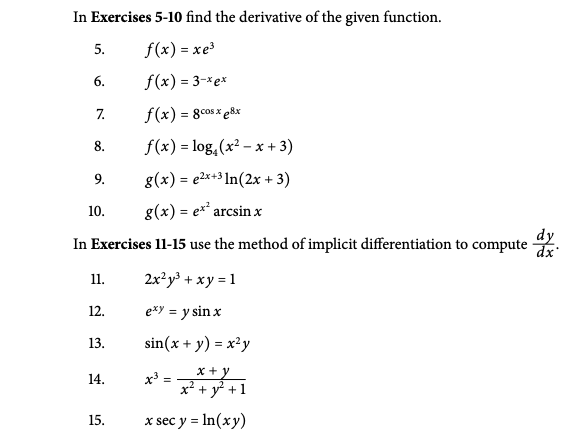



In Exercises 5 10 Find The Derivative Of The Given Chegg Com




Ex 5 5 7 Differentiate The Function Log X X X Log X



1



5 Derivative Of The Logarithmic Function
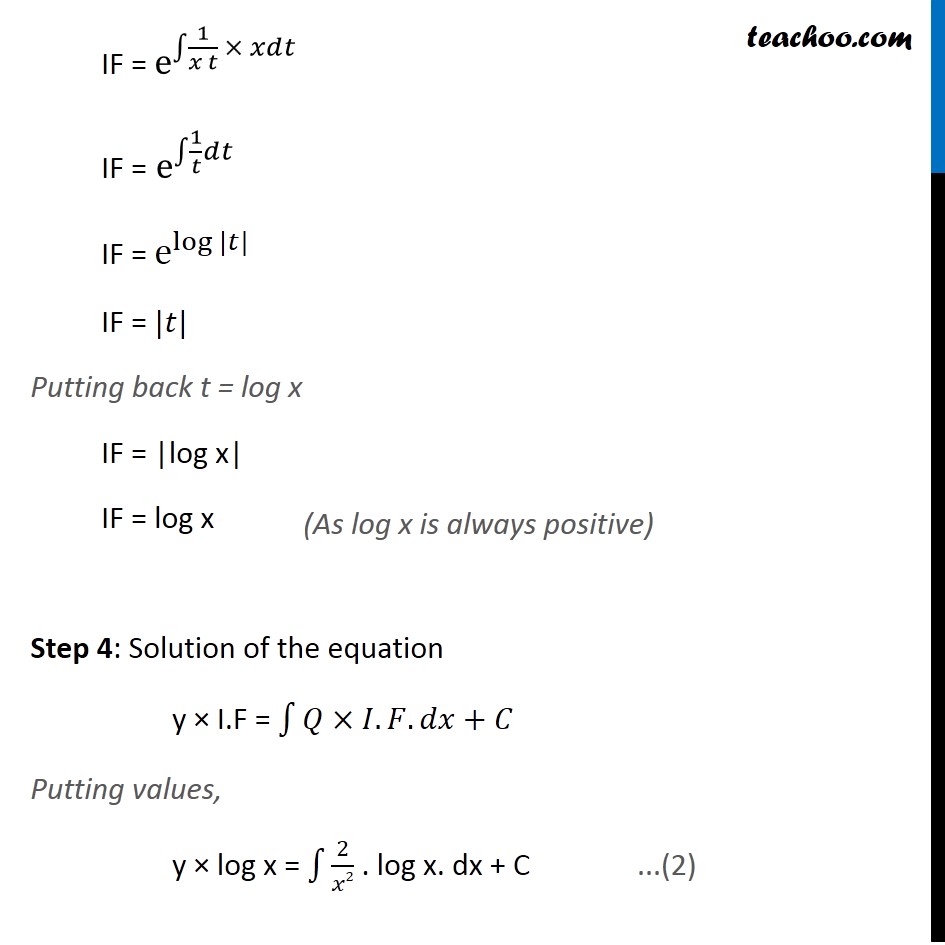



Ex 9 6 7 Find General Solution X Log X Dy Dx Y 2 X Log X




How To Prove That Math Yz Log Y Log Z Cdot Zx Log Z Log X Cdot Xy Log X Log Y 1 Math Quora




First Order Partial Derivatives Of F X Y E Xy Youtube




If X Y E X Y Prove That Dy Dx Logx 1 Logx 2




1 E X Y Dx E X Y 1 X Y Dy 0 Novocom Top




If Sin X Y Log X Y Then Dy Dx Youtube




E X Y Logx Y Differentiate This Brainly In




If Xy Log X Y 1 Prove That Dydx Y X 2y X Y X Xy 2 X Y




Ex 5 5 15 Find Dy Dx Of Xy E X Y Class 12 Ex 5 5




Ex 5 5 15 Find Dy Dx Of Xy E X Y Class 12 Ex 5 5



If X X Y Log A X Y Prove That Dy Dx 2 X Y Brainly In




Differentiate The Following With Respect Of X E X X Logx



If Y X E Y X Prove That Dy Dx 1 Log Y 2 Log Y Sarthaks Econnect Largest Online Education Community




Calculus 1 Ch 5 1 Derivative Of E X And Lnx 19 Of 24 What Is Implicit Differentiation Youtube



What Is The Derivative Of E Logx Quora




X Y E X Y So Prove That Dy Dx Logx 1 Logx 2 Youtube




Ex 5 4 5 Differentiate Log Cos E X Teachoo Ex 5 4



If X Y E X Y What Is Dy Dx Quora



1




Show That Y A Cos Log X B Sin Log X Is A Solution Of The Differential Equation X 2 D 2y Youtube
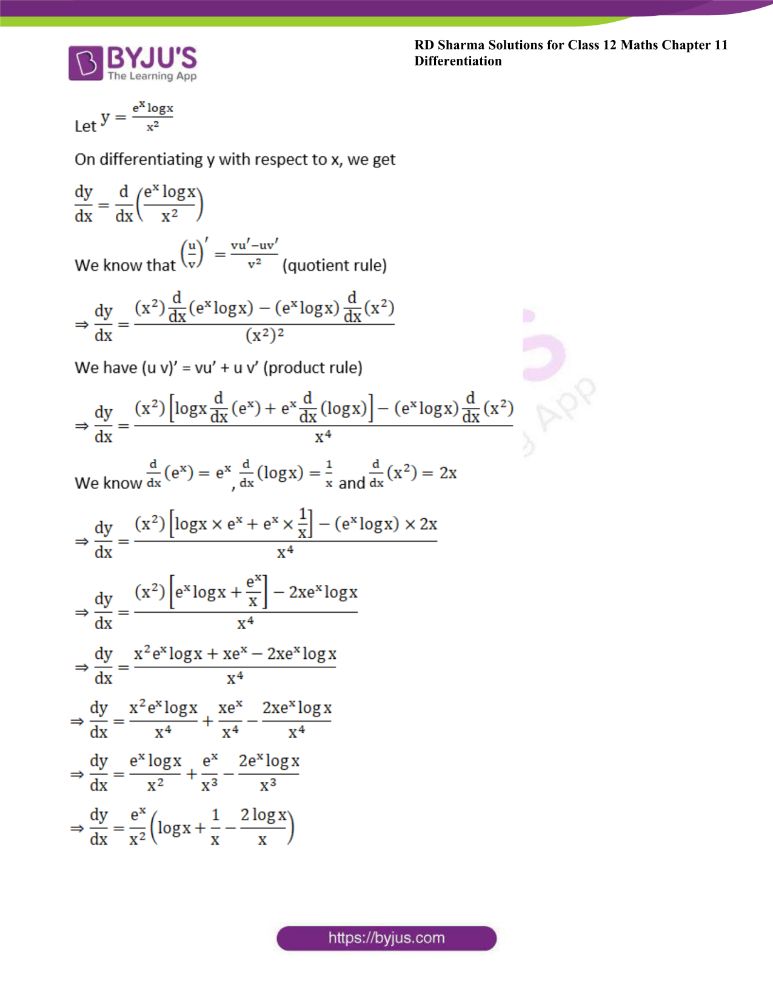



Rd Sharma Class 12 Maths Solutions Chapter 11 Differentiation
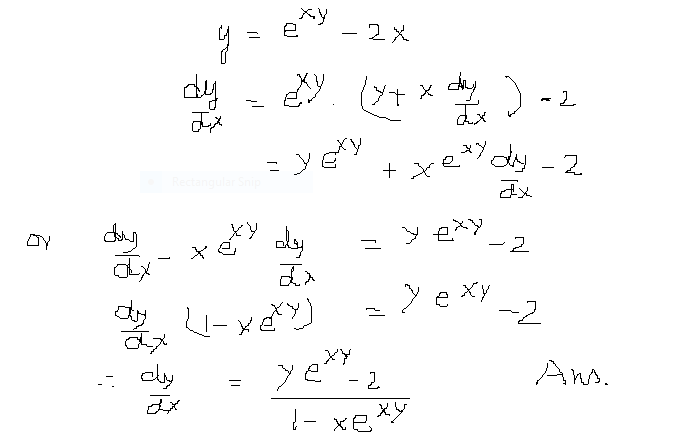



How Do You Differentiate Y E Xy 2x Socratic




Derivative Of Log Y Mathematics Stack Exchange



If Xy E X Y Then Prove That Dy Dx Log X 1 Log X 2 Sarthaks Econnect Largest Online Education Community




Worked Example Implicit Differentiation Video Khan Academy




Implicit And Logarithmic Differentiation
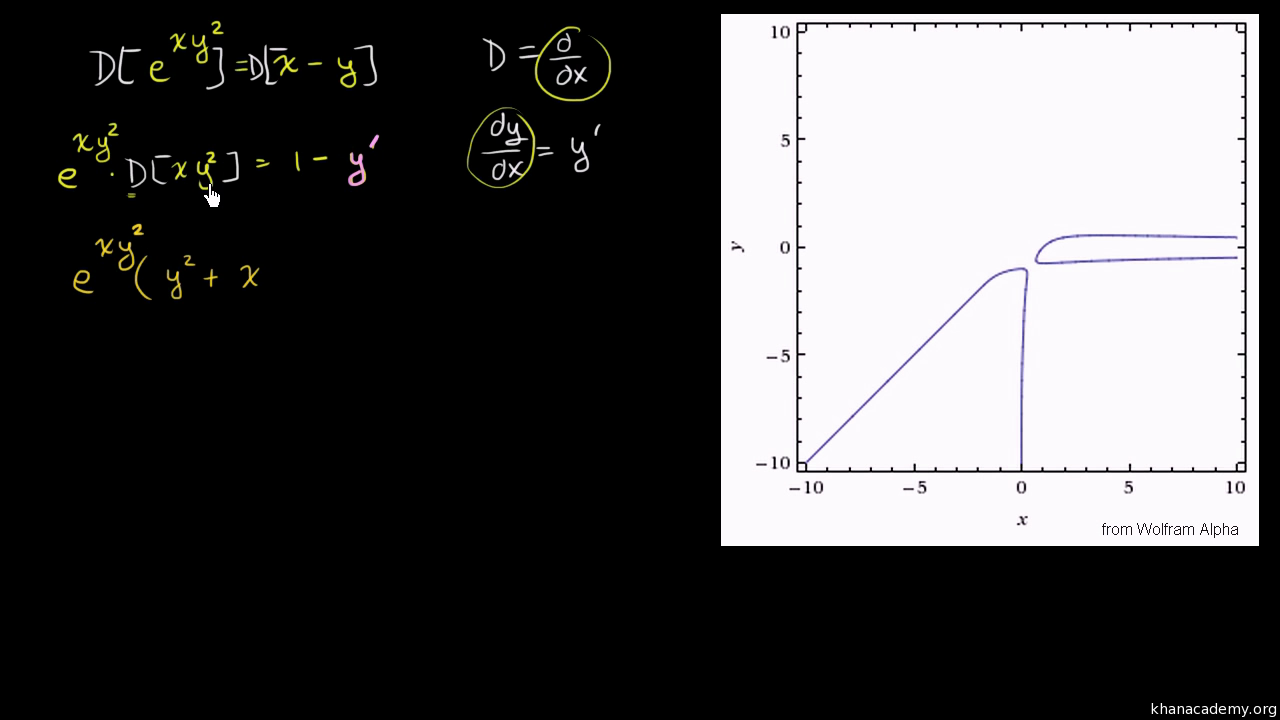



Implicit Differentiation Advanced Example Video Khan Academy




Natural Logarithm Wikipedia




If X Y E X Y Prove That Dy Dx Logx 1 Logx 2




Suppose X Y Z Gt 1 Then Least Value Of Log Xyz Logx Log Y Log Z Logy Log X Log Z Youtube




Log X Y Logx Logy Then X Scholr




Log X Y Logx Logy Then X Scholr




First Order Partial Derivatives Of F X Y Ln X 4 Y 4 Youtube
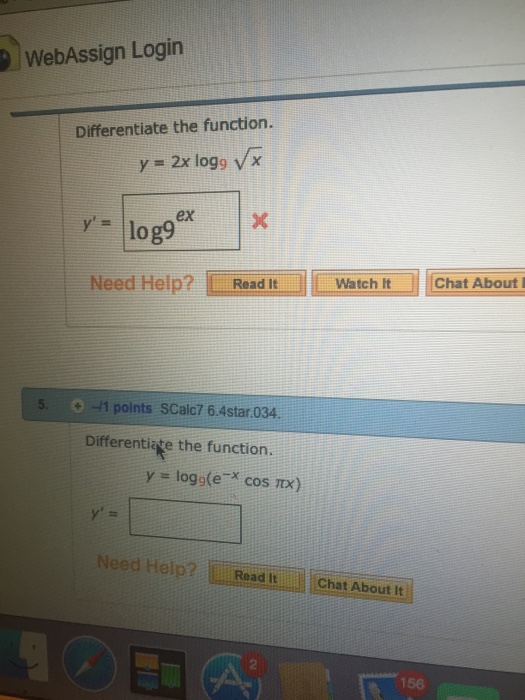



Differentiate The Function Y 2x Log 9 Root X Y Log Chegg Com



If X Y E X Y Show That Dy Dx Logx Log Xe 2 Sarthaks Econnect Largest Online Education Community




Implicit And Logarithmic Differentiation


